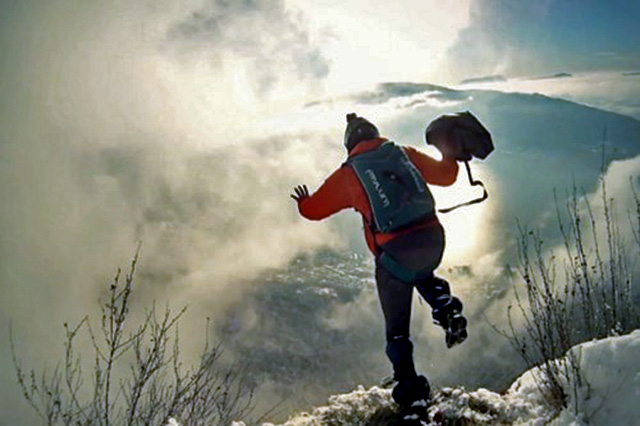BASE jumping is not a sport for the faint of heart. Athletes who practice this extreme sport climb to the top of tall buildings, canyons, or other structures; jump off; enjoy a period of free falling; then open a parachute and coast to the ground.
 BASE jumping in the mountains
BASE jumping in the mountainsThe acronym BASE stands for building, antennae, span, and earth; which make up a comprehensive list of what kinds of fixed objects BASE jumpers plummet from. Span is a term that includes all sorts of bridges, or any other structures that span over a valley or chasm. Earth means anything from cliffs to mountains to canyons.
Did you Know?
The acronym BASE officially stands for Building, Antennae, Span, and Earth. Some people also think that it stands for Blood And Stuff Everywhere!
BASE jumping is very dangerous for a variety of reasons, but the most common causes of injury and death have to do with failure to maintain a clear area around the athlete during the jump and/or the landing. If the wind is against them or if they make a mistake during the launch of their jump, athletes sometimes collide with the object that they have jumped from. Because BASE jumping areas are usually not designated for this guerilla-style sport, the makeshift landing targets that jumpers aim for are rarely large enough to allow for a safe jump. As a result many BASE enthusiasts meet with serious and sometimes fatal injuries because they haven’t been able to steer themselves to the landing area in time.
Many people compare BASE jumping to bungee jumping without a bungee cord, but it is actually much closer to skydiving without an airplane. Jumpers practice many of the same techniques that divers use to maintain stability and altitude awareness while they are in the air. Before becoming a BASE jumper, an athlete must complete a full course of skydiver training. Once they have their full skydiving certification, the next step for anyone interested in BASE is to find a mentor in the jumping community who can teach them how to take on these ambitious freefalls. Only experienced divers can even contemplate a BASE jump because this kind of unguided and somewhat unpredictable activity requires razor sharp awareness of altitude, along with stellar free fall technique.
BASE jumping is one of the most dangerous sports practiced today. Every year, BASE jumping leads to several fatalities, and most major BASE societies and clubs have seen at least one member perish in pursuit of the sport that he or she loved. Because no two jumps are alike, it is very difficult to predict what will happen once you start plummeting towards the ground. This means that to survive a BASE jump you need to have a very level head, an ability to react to surprises without panicking, and lightning speed reflexes that will allow you to make instantaneous adjustments in your position or your trajectory. However, no amount of experience can guarantee that you will complete your jump without mishap, so even very accomplished jumpers are taking serious risks every time they prepare to hurl themselves off of a building, antennae, span, or natural cliff.
About The Author
Gray Rollins is a featured writer for www.rednutsports.com - a site about extreme sports. To learn more about base jumping, visit www.rednutsports.com/basejumping.
Related Pages
- More about Adventure Sports


 Upcoming Events
Upcoming Events